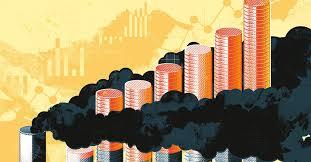
https://www.globalwitness.org/en/press-releases/new-analysis-reveals-big...
LONDON, Wednesday 12 November 2024 – As COP29 talks get underway in Baku, a new Global Witness analysis shows that top oil and gas producers’ profits could pay the entire annual bill for climate loss and damage.
The analysis shows that that the top 30 oil and gas companies (excluding those based in poorer countries) have recorded a combined average of $400 billion USD per year in free cash flow since the Paris Agreement was signed in 2015.
This is the same amount that researchers agree should be considered the minimum for funding needed annually by lower-income countries to deal with the aftermath of climate disasters.
Stories from climate-affected individuals in Brazil, the Philippines, the UK and US are highlighted in the analysis and several of their video testimonies can be viewed on YouTube.
Sarah Biermann Becker, a senior fossil fuels investigator at Global Witness, said:
“From super-charged hurricanes in the US to typhoons in the Philippines, ordinary people are already paying for the climate crisis. They’re paying with their health, homes and livelihoods, and doing what they can to build back in the wake of disaster.
But as people struggle in the wake of climate chaos, there is one sector that’s raking in billions and avoiding any culpability for its role in the devastation – the fossil fuel industry. It’s time to end this injustice. We need billions of dollars to deal with climate impacts, and Big Oil firms are some of the richest companies on the planet – it's time they paid their fair share to repair the damage they’ve done.”
Luana Kaingaing, an indigenous woman from Rio Grande do Sul, Brazil, talking about the catastrophic flooding her community faced in Spring 2024 said:
“We Indigenous Peoples are at the forefront of this battle. Everyone is afraid of the rain now, and all four seasons can happen on the same day. It’s the big companies who are responsible. They are largely to blame for global warming and climate change, so they should pay more, right?
"In the meantime, we’re going to keep fighting for this cause, which is not only ours but humanity’s. We’re going to keep fighting to stop the climate crisis and you’re all welcome to join us.”
Colin Chappell, Lincolnshire, UK farmer and member of the Nature Friendly Farming Network said:
"We have broken nearly every single weather record, climate record, I think this farm can break. The mother of all floods was this year. I think we can make a difference but we need to do it fast and we need to do it soon.
"In agriculture, there is always a polluter pays principle. The polluter should have to fund for the damage they've caused.”
Joseph Mangiben from Buenguet Province, the Philippines, interviewed by ADRA said:
“When I was a child, strong typhoons didn't come consecutively every single year. But today they come one after the other. I feel scared and I'm worried about what might happen. The ones who suffer most are poor nations like the Philippines.”
Two years ago, at COP27 in Egypt, countries set up a fund to respond to climate-related loss and damage, intended to support lower-income countries already devastated by climate change.
Unfortunately, now two years old, the fund is still miniscule. As of October this year, high-income countries have pledged a mere $702 million to the fund. That is less than one-hundredth of what the world will need every year.
However, government pledges are not the only way to raise this money. Our new analysis shows that the most profitable fossil companies – including oil majors BP, Chevron, Exxon, Shell and TotalEnergies – make enough cash in production profits each year to cover those annual losses.
Global Witness is currently inviting members of the public to demand Big Polluters pay up for climate damage via the website cop29.com.
Methodology: Calculating Big Oil’s cash flow
- Free cash flow data was sourced from energy business intelligence agency Rystad Energy’s UCube database. Rystad’s data is widely referenced by major oil and gas companies, the media and international bodies such as the International Energy Agency.
- Rystad data is based on sources including company reporting and policies, government sources and policies, energy service reporting, energy agencies and academic research and news articles. Where reported data is unavailable, such as the remaining months of 2024, data is modelled based on the above sources and supported by a comprehensive database of global oil and gas fields.
- Rystad’s UCube is a database of the global upstream oil and gas market that allows users to query the production and economics of the upstream oil and gas industry. Upstream refers to the exploration and extraction of oil and gas.
- Upstream profit, or free cash flow, is revenue flowing from oil and gas projects to these companies after taxes and royalties, capital expenditure and operating expenditure. Debt service or other corporate costs, e.g. executive salaries, have not been extracted from these revenues. This free cash flow is therefore the profit derived at the project level from selling oil and gas produced before corporate expenses have been paid.
- The Paris Agreement was adopted at the end of 2015. We therefore included data for the period 2016-2024 (full year). This analysis was run in September 2024 and includes Rystad’s projections, based on the above sources, of free cash flow for the remaining months of this year.
- Adapting the approach of Grasso and Heede in their 2023 analysis, we exclude several companies from lower or lower-middle income countries (according to current World Bank classifications) from our list of top 30 fossil companies, in acknowledgement of these countries’ much smaller contributions, and greater vulnerability, to the climate crisis.









